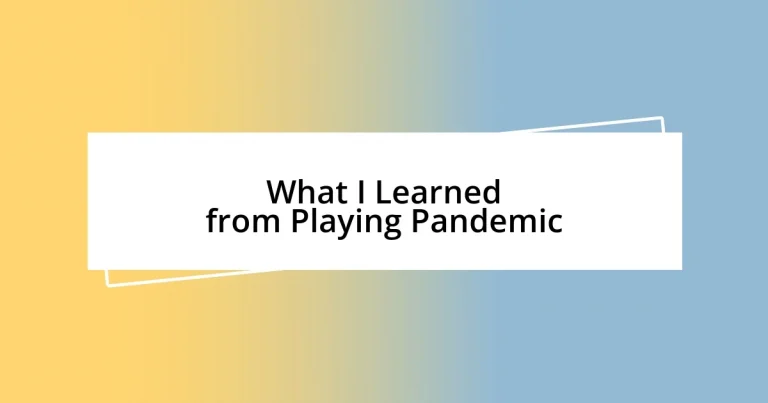Key takeaways:
- Effective teamwork and communication are crucial for success in Pandemic, allowing players to strategize collaboratively and adapt to challenges.
- Understanding game mechanics, such as action points and outbreak potential, enhances strategic play and fosters appreciation for each player’s unique contributions.
- Lessons learned from Pandemic, like planning ahead and remaining adaptable, can be applied to real-life situations, promoting teamwork and effective problem-solving.
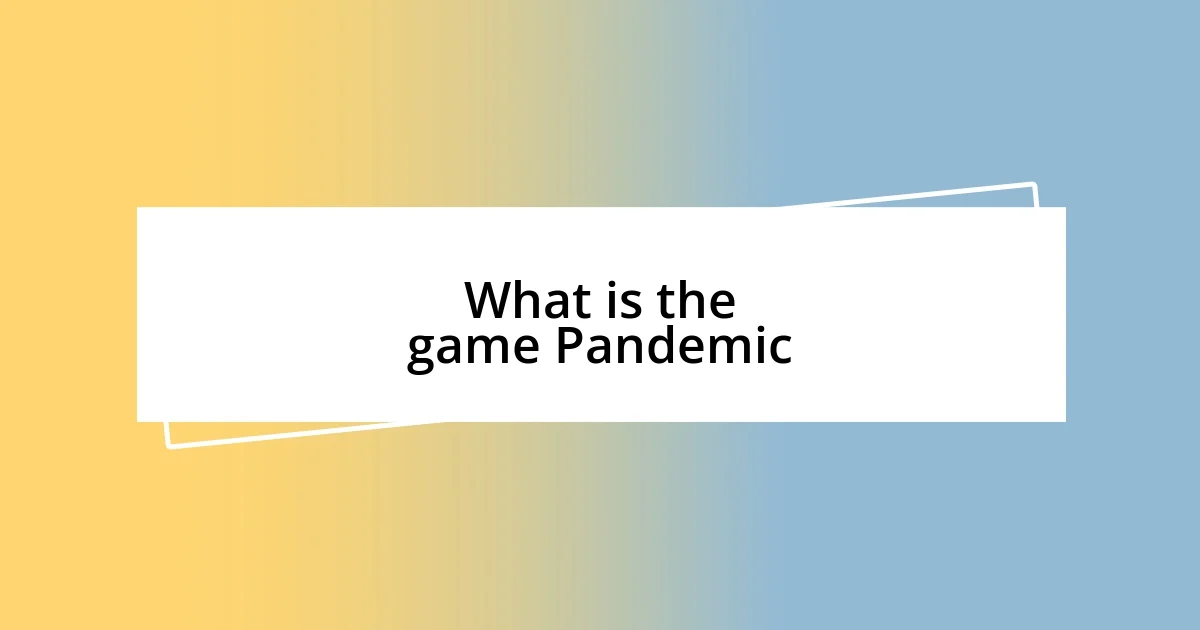
What is the game Pandemic
Pandemic is a cooperative board game where players act as members of a disease control team trying to eradicate threats to humanity. Each game unfolds the narrative of a world besieged by viral outbreaks, which can be incredibly intense and exhilarating. I remember the first time I played; the urgency in our voices as we strategized kept me on the edge of my seat—how could we possibly stop these diseases from spreading?
In Pandemic, players must work together using their unique roles, like the Medic or the Scientist, to develop cures and manage outbreaks. This teamwork really resonates with me, as it feels like we’re all in this together, much like in real-life situations where collaboration is essential. Have you ever felt that rush of accomplishment when a team finally overcomes a challenge? That’s exactly what draws me back to this game again and again.
The mechanics of the game are both straightforward and complex, allowing for strategic play that evolves as the game progresses. I’ve seen my friends go from hesitation to excitement as they make pivotal decisions that can alter the course of the game. It’s fascinating how a simple board can bring so much emotion and connection, don’t you think?

Understanding game mechanics
Understanding game mechanics in Pandemic is key to navigating its challenges effectively. Each player assumes a unique role with distinct abilities, creating an opportunity for strategic collaboration. I remember the thrill of playing the Medic, knowing that my role allowed me to remove disease cubes from the board efficiently. This kind of dynamic fosters not just teamwork, but an appreciation for each player’s contribution.
Consider these important mechanics:
- Action Points: Each turn, players have a set number of actions to improve their position or combat the spreading diseases.
- Infection Rate: Understanding how quickly diseases can spread helps you anticipate threats and plan your moves.
- Cure development: Working towards a cure requires teamwork and resource management, highlighting the necessity of collaboration.
- Outbreaks: Knowing the potential for outbreaks can influence your strategic decisions, adding urgency to your actions.
These mechanics intertwine to create a tension that keeps everyone invested. I often reflect on the moments I underestimated an outbreak’s implications, feeling that pang of panic rise as I realized our plans had to change. It’s both exhilarating and enlightening!
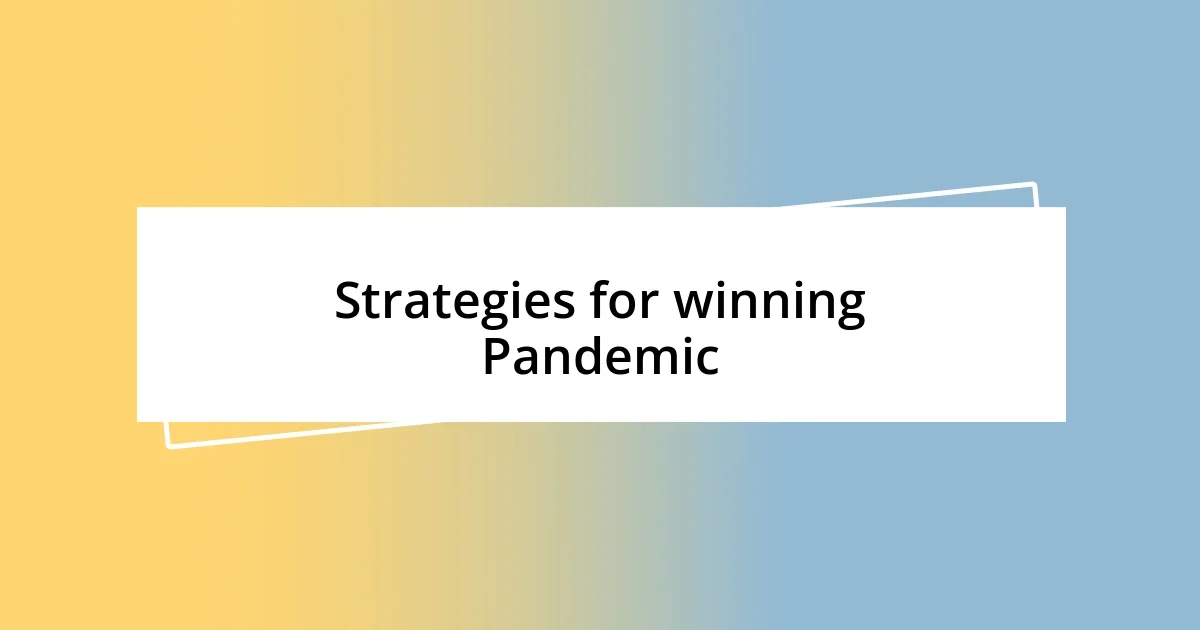
Strategies for winning Pandemic
Winning at Pandemic requires more than just understanding the game mechanics; strategic thinking plays a crucial role. From my experience, one of the most effective strategies is to prioritize curing diseases before they escalate into outbreaks. I recall a session where we faced a rapid spread, and by focusing our efforts on one disease at a time, we turned the game around. It’s remarkable how a clear focus can shift the momentum!
I also find allocating roles wisely can drastically enhance your team’s synergy. Each character’s unique abilities can unlock strategies that are otherwise impossible. When playing with friends, I often noticed that assigning the Dispatcher to facilitate movement or the Scientist to lead cure development could streamline our efforts. How often have you felt that a well-timed action made all the difference in a game? That’s the beauty of role consideration!
Lastly, effective communication throughout the game cannot be understated. I’ve seen how sharing plans, potential risks, and ideas can empower the team. In one memorable game, we had a critical moment where one player suggested altering our route to prevent a looming outbreak; this small tweak saved us from losing. Trust me, being on the same page transforms a frantic struggle into a winning collaboration.
| Strategy | Description |
|---|---|
| Focus on Cures | Concentrate on curing diseases methodically to prevent outbreaks. |
| Role Allocation | Choose character roles that complement the team’s strategy. |
| Open Communication | Share information and strategies openly among teammates. |
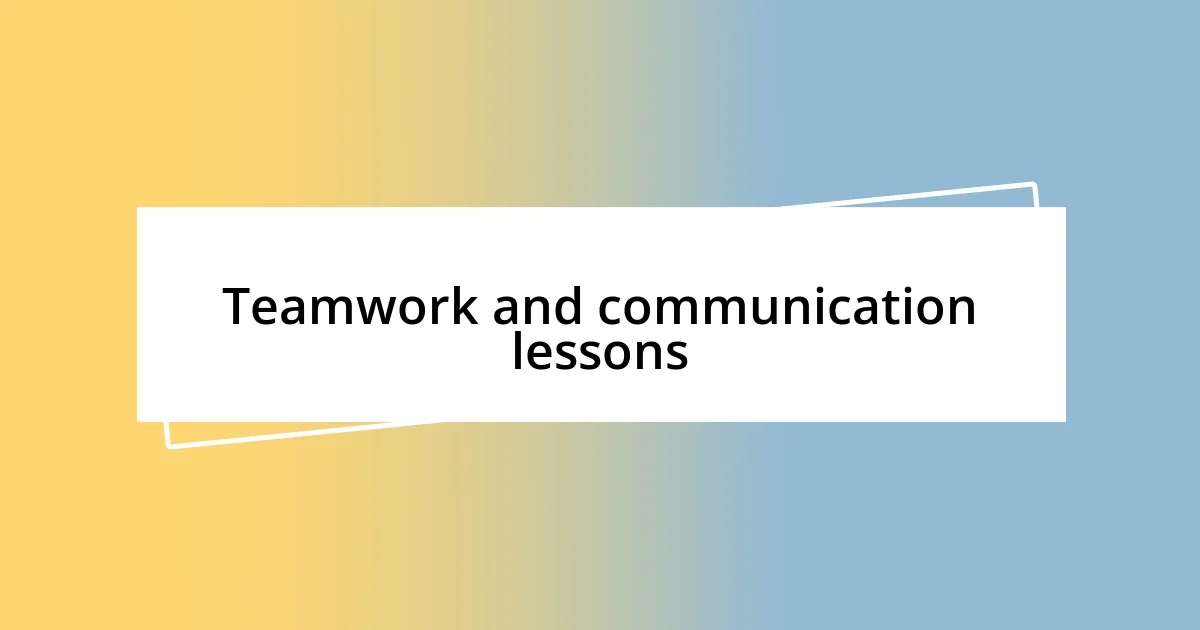
Teamwork and communication lessons
Navigating through Pandemic has taught me invaluable lessons about teamwork and communication. During one especially frantic game, my friend and I realized that our ability to openly discuss strategies was a game-changer. I vividly remember when we faced a dire outbreak; rather than panicking, we laid all our cards on the table and brainstormed together. That moment made me realize how clear communication can turn chaos into clarity—we literally transformed a near-failure into a solid win!
One thing that struck me profoundly is how essential it is to listen to your teammates. I can’t count the times when someone else’s insight shifted our focus just in time. For instance, during another session, I had a plan that seemed solid, but a teammate pointed out an alternative route to reach a crucial city faster. This small, overlooked detail made all the difference. Have you ever experienced a moment like that, where just adjusting your approach based on someone else’s perspective saved the day?
Moreover, the emotional weight of holding each other accountable during the game fosters a deeper connection among the players. When you’re relying on others to carry their weight, you feel that collective pressure. I remember feeling that weight lift when we executed a plan seamlessly; it was exhilarating! This sense of shared responsibility enhances not just the gaming experience but also the underlying friendships, creating memories that extend well beyond the board.
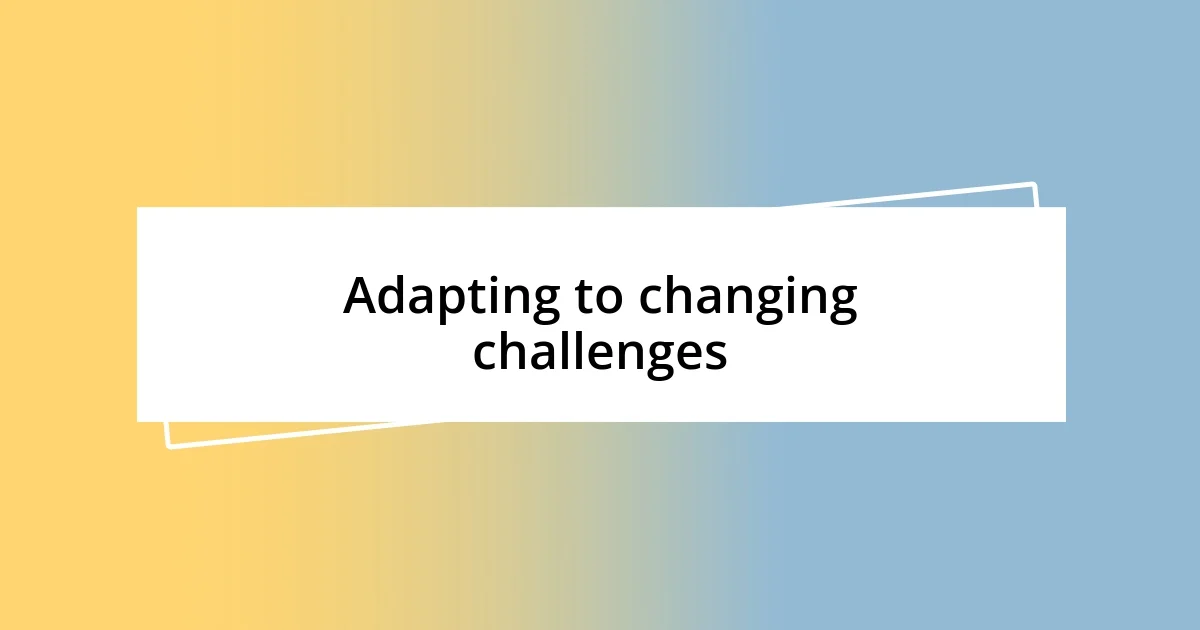
Adapting to changing challenges
Adapting to challenges in Pandemic can be a thrilling rollercoaster. I recall one instance where we were faced with multiple outbreaks spreading simultaneously, creating a palpable tension at the table. Instead of panicking, we took a collective breath and reassessed our position. That moment taught me the importance of flexibility; being willing to pivot our strategies on the fly was key to navigating that chaos.
One thing I’ve learned is that staying calm under pressure is an indispensable skill. There was a nail-biting game where we were down to just a couple of outbreaks left, and a friend suggested we shuffle our focus from one city to another at the last minute. I instinctively hesitated, but in that moment, I realized that trusting their intuition could lead to unforeseen victories. Adapting in real time not only reconfigured our strategy but also deepened our bond as teammates.
I’ve found that keeping an open mind about potential setbacks is crucial for success. During one game, we ran into a situation where we miscalculated our resources, and instead of letting it derail our momentum, we brainstormed alternatives. It felt empowering to see us navigate through that challenge together. Have you ever found yourself in a scenario where the unexpected became an opportunity? That lesson of resilience resonates beyond the game; it reminds me that being adaptable helps turn obstacles into stepping stones, both on and off the board.

Importance of planning ahead
Planning ahead in Pandemic is not just a strategy; it’s a lifeline. I remember a game where we faced an impending outbreak, and before moving, I suggested we prioritize our actions based on our roles. This foresight allowed us to allocate resources efficiently and create a preventive barrier against the spreading virus. Do you see how a little pre-planning can change the entire course of the game?
I’ve found that envisioning potential hurdles can make a massive difference. In one particularly intense match, my team mapped out our next several turns with explicit goals in mind. When new cards were drawn, instead of feeling overwhelmed, we quickly adapted our original plan to include these unforeseen variables. This exercise in foresight not only helped us stay one step ahead but also reinforced our confidence. Have you ever realized how simply anticipating problems can make the game seem less daunting?
The emotional satisfaction of setting a robust plan in motion is something that has stuck with me. I clearly recall the thrill when we executed a carefully crafted strategy that led us to victory. We had agreed on our global approach, and when everything clicked into place, it was exhilarating! This experience taught me that planning ahead isn’t merely about the tactics; it’s also about the camaraderie it builds. How gratifying is it to watch a well-laid plan come to fruition, knowing that every player’s input played a crucial role?
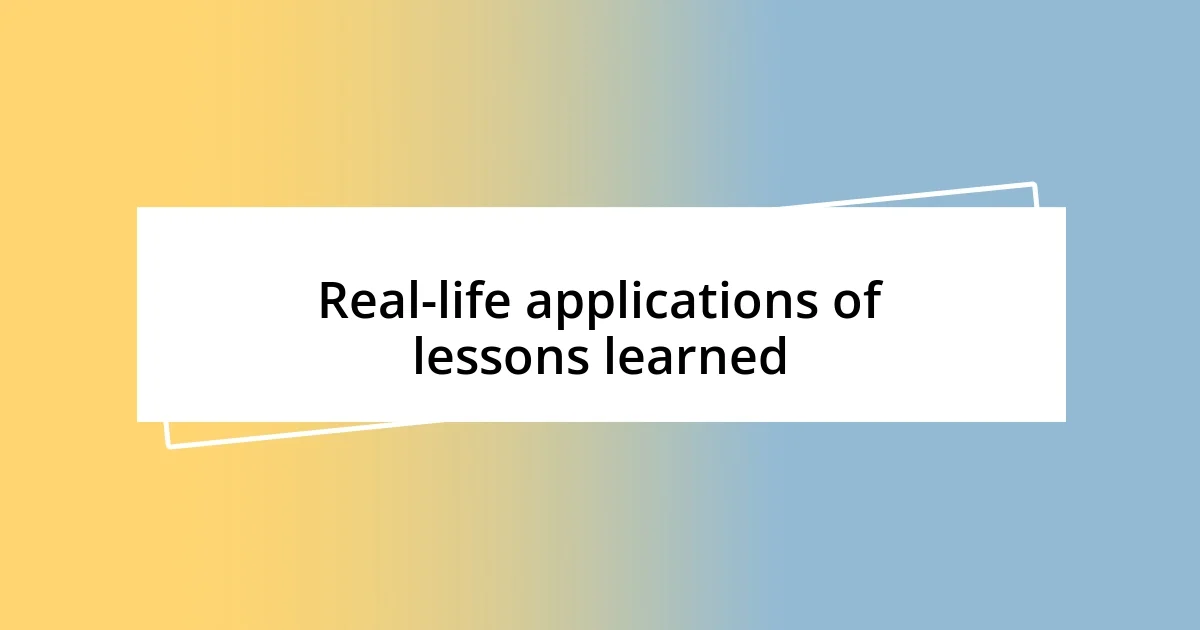
Real-life applications of lessons learned
Real-world scenarios often mirror the strategic foresight we apply in Pandemic. I remember a time when my team faced a project deadline that felt insurmountable. Just as we did in the game, we broke down the tasks, identified key roles, and mapped out our timeline together. This not only made the workload manageable but also infused a sense of teamwork and shared purpose; I felt a strong bond with my colleagues, similar to that which develops around the game board. Have you experienced a moment when clear planning helped your team rally together?
Collaboration is another lesson that reverberates in both life and play. I often think back to a specific game where one player’s bold move saved us from disaster—even though it was a gamble. That take-charge attitude inspired me to embrace collaborative risk-taking in my professional life. When a coworker brings a daring idea to the table, I find myself asking, “Could we be overlooking something brilliant?” Trusting each other’s insights can shift the dynamics in our real lives just as it did in that game.
I can’t emphasize enough the power of remaining adaptable in the face of unexpected challenges. Recently, our department encountered a sudden change in regulations that required a quick pivot, much like responding to evolving outbreaks in Pandemic. Initially, we felt a wave of anxiety, but instead of freezing up, we brainstormed alternative strategies. It was reminiscent of planning a new path in the heat of the game. Is there anything more satisfying than transforming potential setbacks into strategic advantages with your team? The thrill of overcoming those hurdles solidifies my belief that these lessons learned aren’t just for the board game; they’re essential for real-world relationships and successes.












